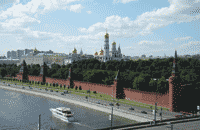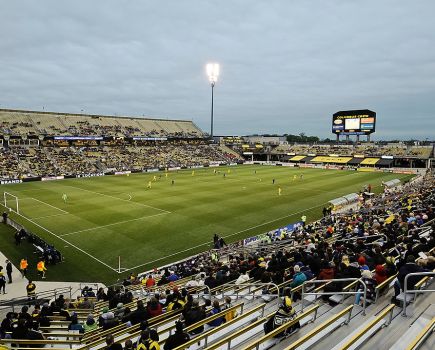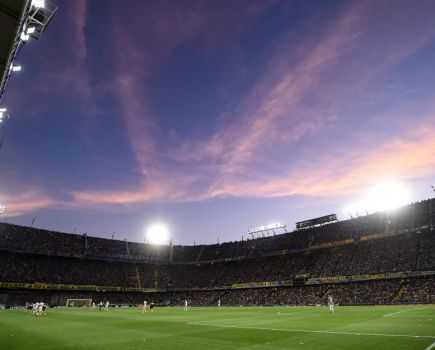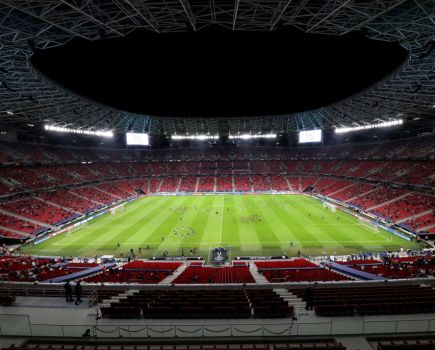MOSCOW

Moscow's Kremlin building
Moscow with its five top-division clubs sharing four stadiums, is a groundhopper’s dream. Venues range from the prestigious Luzhniki national stadium, home of the most popular club, Spartak, to the Dynamo Moscow ground, little changed since Lev Yashin’s day.
Since the break-up of the Soviet Union and the establishment of a Russian League in 1992, all titles but one have gone to Moscow’s top three clubs: Spartak, Lokomotiv and current champions CSKA. With a quarter of this year’s season gone, four of the top five places were taken by Muscovite sides – Spartak, CSKA, FC Moscow and Dynamo.
Crosstown rivalries link to old Communist allegiances and offer an interesting historic and economic dimension to an afternoon’s football. Moscow’s traditional clubs were formed in the 1920s, at the start of the Soviet era. Dynamo were connected to the ministry of the interior and the KGB, CSKA represented the army, and Lokomotiv the railway workers.
Spartak were defiantly independent, with only vague affiliations to the local food producers’ co-operative, hence their popularity after the fall of Communism.
Petrodollars and privatised national industries have provided the bulk of the finance for these clubs to thrive in recent years: Spartak are sponsored by Lukoil, CSKA were until recently backed by Sibneft, Yukos have been linked to Dynamo. Lokomotiv have earned enough from Moscow Railways to build a superb, 30,000-capacity stadium, the envy of all in the capital.
FC Moscow were born out of the 1998 split at Torpedo, the other big traditional Muscovite club, once connected with car production. The original Torpedo are now a mid-table second-division side who play in front of a few thousand fans at the Luzhniki. Breakaway Torpedo-ZIL became Torpedo Metallurg, then the club were adopted by Moscow mayor Yuri Luzhkov and the city council as FC Moscow. The team play at the renovated Torpedo stadium in south-east Moscow.
The Russian league season runs from March to November. Admission to any of the stadiums is reasonably cheap, and access, via Moscow’s celebrated metro system, is swift and relatively easy, even for the non-Russian speaker. At the grounds, bars provide lager, vans offer vats of local kvas – a cold, refreshing, low-alcohol beer – grills serve shashlik kebabs, and stalls sell newspaper cones of sunflower seeds. Little has changed for decades.
With so many clubs in the top flight, big games in Moscow come thick and fast. Take the weekend of July 21/22. On the Saturday, Spartak, top by three points from CSKA after eight rounds, host Zenit St Petersburg, the strongest provincial club and lying third. The next day, Lokomotiv host the clash with CSKA.
Young Spartak striker Roman Pavlyuchenko was league top scorer in 2006 as the team finished runners-up for the second year running. Attacking midfielder Yegor Titov, the fans’ favourite, is back among the goals this year. An early Titov strike helped Spartak to a 3-1 win at Zenit in March; the St Petersburg side, coached by Dick Advocaat, will be under pressure to gain a revenge win at the Luzhniki to keep alive their hopes of improving on their second-place finish in 2003.
Change at the top
Spartak were champions for nine of the first 10 years of the Russian League. Since the end of that run, in 2002, Lokomotiv and CSKA have been the two biggest clubs in the Russian game, while also making considerable progress in Europe. CSKA became the first Russian club to lift a European trophy, the UEFA Cup in 2005, while Lokomotiv have given creditable performances in the Champions League group stage.
The Lokomotiv stadium, opened after a complete overhaul in 2002, is a model of how a mid-range club ground should be and is used by other Moscow teams for European games. Despite progress on the pitch, CSKA are still having to use Dynamo’s old stadium. Iconic midfielder Dmitri Loskov is the player to look out for in the “Loko” line-up; Brazilian striker Vagner Love is the key man for CSKA.
Stadium guide

Lokomotiv Moscow stadium
The 84,000-capacity Luzhniki stadium stages games of the Russian national side, Spartak and Torpedo. It also hosted the 2008 Champions League Final. The Luzhniki, the main stadium for the 1980 Olympics, is set on a tongue of land in a bend of the Moscow river, facing the Sparrow Hills.
It is an easy metro journey ride south-west of the centre, on red line 1, to Sportivnaya.
Spartak tickets, which cost around 500 roubles (£10), are sold at www.smbilet.ru or at several outlets around the city, including an office at Noviy Arbat 2 (11am to 7pm). The main club shop is Krasno-Beliy Sport (Sadovaya-Chernogryazskaya ulitsa 16/18; +7 495 628 7872), near Krasniye Vorota metro station.
The smart new Lokomotiv stadium (Bolshaya Cherkizovskaya 125; +7 495 161 4283) is at Cherkizovskaya, near the north-west end of metro line 1. Allow 25 minutes from central Okhotniy Ryad. You can order tickets from the club’s
website.
Dynamo and CSKA share the basic, 36,000-capacity Dynamo stadium, by the metro station of the same name on green line 2, on Leningradski prospect north of the city centre. FC Moscow are based at the renovated Torpedo stadium, named after Torpedo hero Eduard Streltsov. It is an easy walk from Avtozavodskaya metro station on line 2.
Survival Guide

Moscow at night
Arrival & transport
British Airways flights use
Domodedovo airport (+7 495 933 6666), 50km south of Moscow. The centre can be reached by bus (number 851) or an express train. Aeroflot still uses Sheremetyevo airport, 30km north-west of town, from where bus 551 runs to the Rechnoy Vokzal metro station. Moscow’s metro (pictured top) is ornate, cheap and efficient. There are also buses, trolleybuses and trams.
Hotels
To enter Russia you need a
visa, to receive which you need at least one night pre-booked at a hotel. The
Baltschug Kempinski (Balchug ulitsa 1; +7 495 230 5500 or 6500) is a luxury choice, with prices from £200 per room. The central
Hotel Ukraina (£90) (Kutuzovsky prospect 2/1; +7 495 229 8301) has river views. The
Izmailovo Gamma-Delta (Izmailovskoye shosse 71; +7 495 737 7000) has rooms for under £35.
Eating & drinking
Visitors with plenty of money can enjoy the Pushkin (Tverskoy bulvar 26; +7 495 229 5590) and its classic Russian fare. Atmosphere and intimacy are guaranteed at the reasonably priced Cafe Margarita (Malaya Bronnaya ulitsa 28; +7 495 299 6534). Or there’s the chic and contemporary Bulvar (Petrovka ulitsa 30/7; +7 495 209 6798).
The Krasny Bar (Tarasa Shevchenko naberezhnaya 23a; +7 495 730 0808) has a panoramic view of the river.
Daytime entertainment
The Kremlin (+7 495 202 6649; closed Thu), a walled complex of onion-domed cathedrals, palaces and museums, is best visited on an organised tour – ask at your hotel. Highlights include the crown jewels of the early tsars and the huge Tsar Bell. Adjoining Red Square boasts St Basil’s Cathedral (+7 495 298 3304; closed Tue) and Lenin’s mausoleum (closed Sat & Sun).
The most impressive cultural attractions are the Fine Art Museum (Volkhonka ulitsa 12; +7 495 203 9578; closed Mon) and the Tretyakov Gallery (Lavrushinsky pereulok 10/12; +7 495 230 7788; closed Mon), with its Russian art and icons.
After dark
Stalwart club Propaganda (Bolshoy Zlatoiustinsky proyezd 7; +7 495 924 5732) has imitators – try the Kult Club (Yauzskaya naberezhnaya 5; +7 495 917 5706). Fabrique (Kosmodamianskya naberezhnaya 2; +7 495 540 9955) is consistently good.








